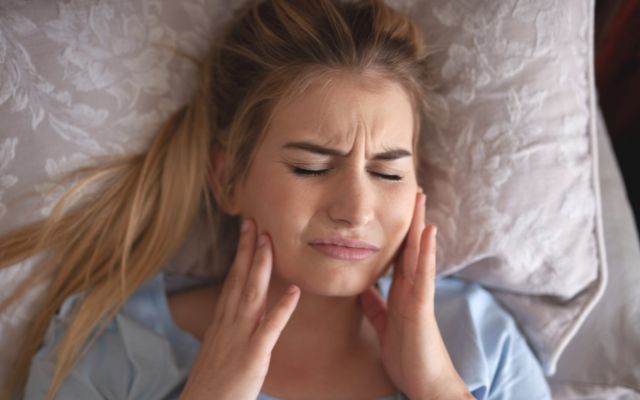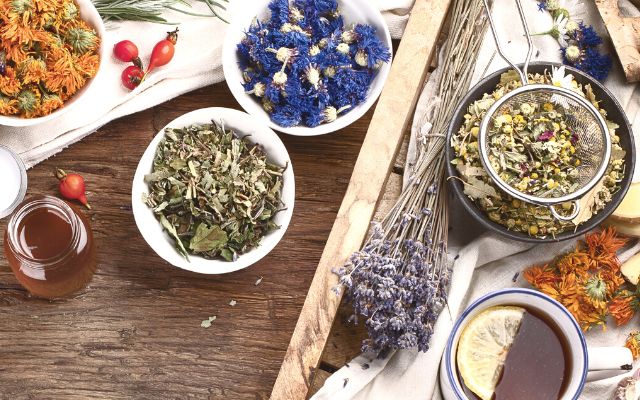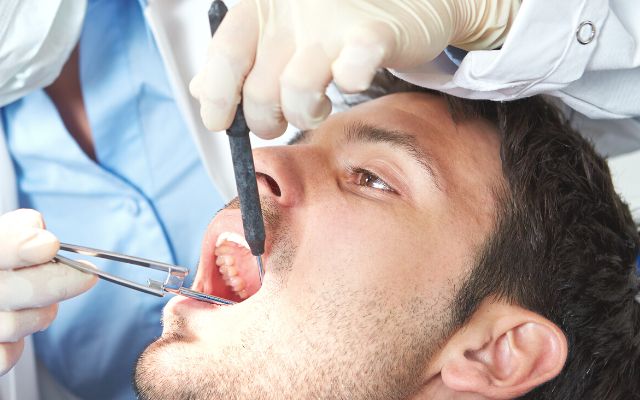How To Stop Grinding Teeth In Sleep Naturally: Even though many people are unaware that they grind their teeth, teeth grinding, or bruxism, which affects around one in ten adults, is a problem that should not be overlooked. In this article, I will provide you ten remedies to prevent you from Grinding Teeth during sleep and more.
Let’s get started!
What is night-time teeth grinding?

Teeth grinding (bruxism), a common instinctive response to stress, anxiety, or anger, can occur either while awake or asleep, but it is far less frequently observed during sleep. This is primarily due to the fact that many people are unaware they are doing it.
However, failure to recognize bruxism might have grave consequences. Because people are unaware of the force of their bite during sleep, the force exerted when forcefully clenching the jaw and teeth can cause major problems with both the teeth and jaw.
Studies have revealed that up to 250 pounds of force can be exerted during bouts of sleep bruxism, often known as nighttime teeth grinding. However, many people do not understand the consequences of their activities until it is too late.
How prevalent is tooth grinding during night?
Statistics on sleep bruxism are often difficult to get because many individuals are unaware that they grind their teeth during sleep. However, we have not been deterred. According to studies, 6% to nearly 50% of children experience nighttime tooth grinding to some degree.
This is partly attributed to the fact that a complete set of adult teeth takes between 17 and 25 years to erupt from birth.
Cause of Grinding Teeth In Sleep

Although there is rarely a single cause for nighttime teeth grinding, the disorder is frequently related with stress and worry. It is speculated that this is due to the fact that when we are stressed, our bodies accumulate a great deal of tension throughout the day, and those with sleep bruxism tend to release this tension by grinding their teeth during sleep.
Additionally, teeth grinding can be caused by a variety of sleep disturbances and preexisting conditions. In recent years, numerous studies have connected sleep bruxism to disorders such as obstructive sleep apnea, sleep paralysis, Parkinson’s disease, epilepsy, and ADHD.
Additionally, certain medicines are frequently related to tooth grinding. This covers both legal and illegal substances, such as antidepressants, alcohol, nicotine, and caffeine.
What impact does tooth grinding have?
Long-term, untreated teeth grinding can cause severe damage to the teeth, causing them to feel excruciating pain or possibly disintegrating them over time. In addition, fillings, crowns, and implants can deteriorate with time, posing a potentially expensive and unpleasant repair issue.
Sometimes, one of the most well-known effects of tooth grinding does not impact the individuals themselves. Similar to the sound of nails on a blackboard or a newborn wailing, the sound of teeth grinding is one of those sounds that affects many individuals, including spouses.
10 Natural Remedies to Stop Grinding Teeth In Sleep

Watch what you consume
What you consume as part of your diet can make a significant difference in your ability to manage sleep bruxism. Hard foods like nuts, popcorn, and many candies should be avoided at all costs, while sticky, difficult-to-chew foods such as peanut butter should be approached with extreme caution.
However, foods rich in magnesium, such as leafy green vegetables, yogurts, and brown grains, should be chosen due to their capacity to reduce inflammation during sleep.
Drink warm milk
Drinking warm milk with turmeric can be of great assistance when attempting to overcome teeth grinding-related sleep disturbances organically. This is largely due to the nerve-relaxing impact of tryptophan, an amino acid derived from milk, and the anti-inflammatory and pain-relieving properties of turmeric, a well-known spice.
Avoid alcohol and caffeine
As previously stated, coffee and alcoholic beverages should be avoided when attempting to overcome sleep bruxism. This is due to the effect of these chemicals on disrupting sleep patterns, causing hyperactive jaw muscles and teeth grinding.
Adopt the use of essential oils and aromatherapy
Stress is the most prevalent cause of sleep bruxism, and essential oils might be your best ally in reducing it. Lavender, cedarwood, bergamot, and chamomile have been demonstrated to have notably soothing effects on the brain, and are extensively employed in a variety of aromatherapy-based treatments. Therefore, purchasing an oil diffuser to alleviate your nighttime teeth grinding organically could be a wise investment.
Lavender oil should be rubbed into the jaw
A few drops of lavender oil massaged into the underside of the jaw before bedtime can help release any tension that may have subconsciously accumulated in the mouth over the day. In addition, the circular motion will encourage your mouth to relax, allowing you to fall asleep in a more natural state of relaxation.
Perform meditation
Numerous studies conducted over the years have proved the positive impact of mindfulness on mental health, with practices such as meditation and breathing exercises being especially effective at reducing feelings of stress and anxiety. It has also been demonstrated that meditating to soothing noises, such as ocean waves, raindrops, or traditional white noise, calms the autonomic nervous system, helping to decrease breathing, reduce heart rate, and increase sleeping efficiency.
Get into yoga
Yoga has been proven to be particularly effective at reducing the inflammatory symptoms associated with sleep bruxism. While most forms of exercise can assist to alleviate sleep bruxism in some way, yoga has been found to be particularly effective.
Practicing yoga positions that focus on stretching the neck, jaw, and mouth region, such as the ‘eyes around the clock,’ ‘camel,’ and ‘bridge’ poses, for instance, could help relieve facial tension and inhibit nighttime teeth grinding in a more natural way.
Consider herbal tea
Since nighttime teeth grinding is exacerbated by emotions of nervousness and tension, consuming non-caffeinated herbal tea – such as green or chamomile tea – can be an excellent way to relax your mind and body, relieving the pent-up sensations of stress that are commonly connected with the problem.
Apply a warm compress
Using a hot cloth, compress, or heating pad on a regular basis has been demonstrated to relax the muscles surrounding the teeth, jaw, mouth, and neck. This, in turn, increases the blood supply to these areas, improves circulation, and reduces the potentially detrimental consequences of teeth grinding during sleep.
Wear a Mouthguard or Mandibular Repositioning Device
Mouthguards or MRDs can stop teeth from grinding during sleep. They create a barrier or reposition the jaw to prevent grinding. Mouthguards cushion the teeth and reduce damage, while MRDs move the lower jaw forward to keep the airway open. However, these devices don’t address the underlying cause of teeth grinding. It’s important to seek professional help to develop a treatment plan.
Which natural treatment for nighttime teeth grinding is best for me?

It is important to first seek a professional evaluation from your dentist to determine the severity and cause of your nighttime teeth grinding, also known as bruxism. Once the underlying cause has been identified, appropriate treatment options can be recommended.
In terms of natural treatments, there are several options that may be effective for some individuals. These include stress-reducing techniques, such as meditation or deep breathing exercises, as stress is a common trigger for teeth grinding. Additionally, establishing a relaxing bedtime routine and ensuring adequate sleep may also help reduce nighttime teeth grinding.
It is important to note that while natural treatments may be helpful for some individuals, they should not be used as a substitute for professional dental or medical care. A dentist or other healthcare provider can provide personalized recommendations and monitor the effectiveness of any treatment plan.
Conclude
In conclusion, while there are several natural remedies that may help to alleviate nighttime teeth grinding, it is always advisable to consult a dental professional for an accurate diagnosis and treatment plan.
At Spring Orchid Dental, our team of experienced dentists is dedicated to providing comprehensive dental care and education to help you achieve and maintain a bright, healthy smile.
Our services range from teeth whitening to preventative and cosmetic procedures, all performed with cutting-edge technology and techniques to ensure your safety and comfort.
We are committed to putting your needs first and providing a welcoming, trusting environment for all of our patients.
FAQs
Can you stop teeth grinding on your own?
It may be possible to stop teeth grinding on your own by practicing relaxation techniques, avoiding stimulating substances before bedtime, and improving sleep hygiene. However, it’s important to address the underlying causes of teeth grinding and seek professional treatment if necessary.
Do teeth regrow following grinding?
Teeth cannot regrow following grinding as the tooth structure lost due to grinding is irreversible. Grinding can cause wear and tear of the enamel, leading to tooth sensitivity and possible damage to the underlying dentin layer. If left untreated, it can lead to further complications such as tooth fractures and cracks, which may require restorative procedures such as fillings, crowns or even extractions.
Does everybody clench their teeth during the night?
Researchers believe that 12 to 31% of adults grind their teeth at night, with the majority going undetected. Up to fifty percent of children may experience teeth grinding. This is a curable epidemic that we do not have to accept as a way of life.





